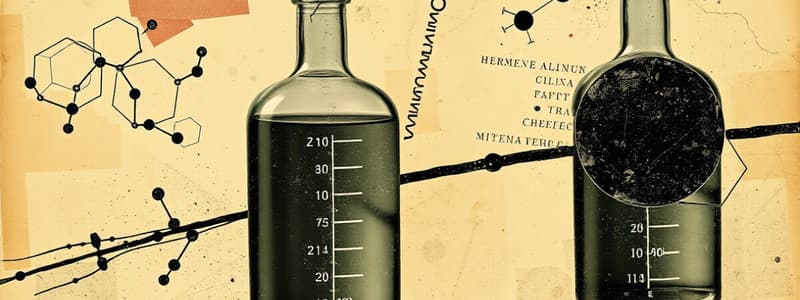Podcast
Questions and Answers
What is the formula for hydrogen hydroxide?
What is the formula for hydrogen hydroxide?
- H2O (correct)
- H2O2
- HOH (correct)
- O2H
What type of bond exists between the atoms in a water molecule?
What type of bond exists between the atoms in a water molecule?
Covalent bond
What is the charge of the water molecule?
What is the charge of the water molecule?
Neutral charge
The bonds between hydrogen and oxygen in a water molecule are called polar covalent bonds.
The bonds between hydrogen and oxygen in a water molecule are called polar covalent bonds.
What typically causes polar covalent bonds to form?
What typically causes polar covalent bonds to form?
What is characteristic of non-polar covalent bonds?
What is characteristic of non-polar covalent bonds?
What happens to water molecules when they freeze?
What happens to water molecules when they freeze?
Why is water considered a good solvent?
Why is water considered a good solvent?
Flashcards are hidden until you start studying
Study Notes
Hydrogen Hydroxide Overview
- Hydron hydroxide is chemically known as H2O, consisting of two hydrogen atoms and one oxygen atom.
Structure of a Water Molecule
- A water molecule contains a covalent bond formed between two hydrogen atoms and one oxygen atom, leading to unequal sharing of valence electrons.
- Electrons are more attracted to the oxygen atom, causing them to remain closer to it.
Electric Charge of Water Molecule
- A water molecule exhibits slight negativity from the shared electrons and slight positivity from hydrogen atoms.
- Despite this, the overall charge of a water molecule remains neutral.
Bonds in Water Molecule
- Polar covalent bonds exist between the hydrogen and oxygen atoms, characterized by an unequal distribution of electrons.
Polar Covalent Bonds
- These bonds typically occur between atoms that are significantly different in their electronegativity, located far apart on the periodic table.
Non-Polar Covalent Bonds
- Non-polar covalent bonds occur when atoms in the bond have equal electronegativity, resulting in a uniform charge.
Behavior of Frozen Water
- When water freezes, its molecules form a rigid structure, maintaining space between them, which is crucial for ice's lower density compared to liquid water.
Water as a Solvent
- Water's ability to dissolve substances, such as salt, is due to its polar nature; hydrogen's negative charges attract sodium's positive charges, while oxygen's positive charge attracts chlorine's negative charges.
Studying That Suits You
Use AI to generate personalized quizzes and flashcards to suit your learning preferences.




